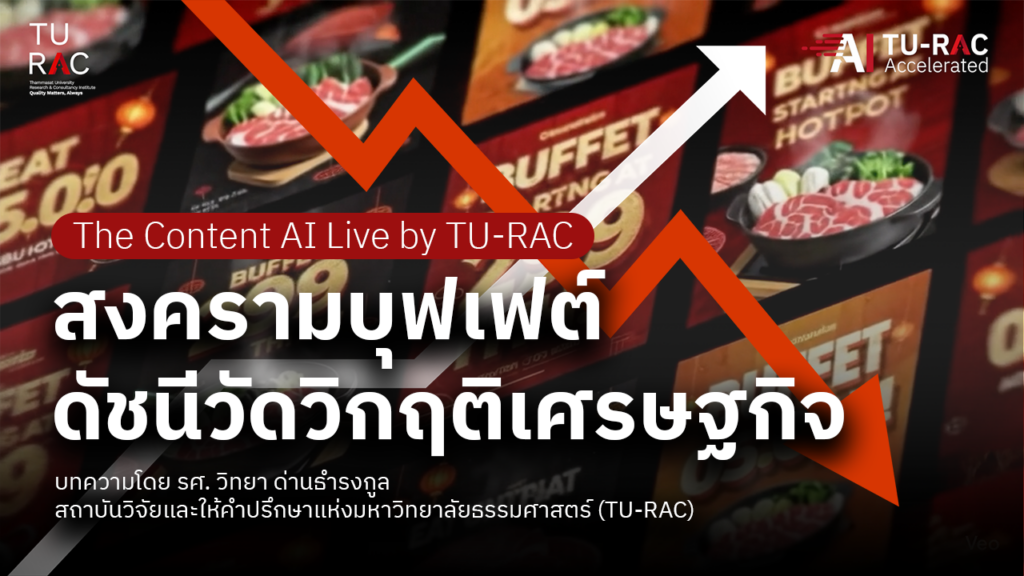video : สงครามบุฟเฟต์ : กระจกสะท้อนเศรษฐกิจไทย
บทความโดย รศ.วิทยา ด่านธำรงกูล สถาบันวิจัยและให้คำปรึกษาแห่งมหาวิทยาลัยธรรมศาสตร์ (TU-RAC) ในหนังสือพิมพ์กรุงเทพธุรกิจ และกรุงเทพธุรกิจออนไลน์ เรื่อง สงครามบุฟเฟต์ ดัชนีวัดวิกฤติเศรษฐกิจ
.
ในวันที่เศรษฐกิจชะลอตัว ผู้คนเริ่มมองหาความคุ้มค่าในทุกการใช้จ่าย หนึ่งในภาพสะท้อนที่ชัดเจนคือ “สงครามบุฟเฟต์” ร้านอาหารหลายแบรนด์ โดยเฉพาะสุกี้ชื่อดัง ต้องปรับกลยุทธ์ครั้งใหญ่เพื่อดึงดูดลูกค้าที่จับจ่ายอย่างระมัดระวัง ร้านสุกี้ที่เคยครองตลาดด้วยสาขามากกว่า 400 แห่งในห้าง กลับพบว่ายอดขายลดลง จึงต้องออกโปรแรง ลดราคาถึง 50% หรือเปลี่ยนรูปแบบเป็นบุฟเฟต์แบบกินไม่อั้น ในขณะเดียวกัน ร้านนอกห้างและร้านเปิดดึกก็ผุดขึ้นราวดอกเห็ด เปิดบริการถึงตี 5 เพื่อตอบโจทย์ลูกค้าที่อยากอิ่มคุ้มในราคาจับต้องได้
.
การเติบโตของบุฟเฟต์ในช่วงนี้ ไม่ได้เป็นเพียงเทรนด์อาหาร แต่เป็นเหมือน “ดัชนี” วัดสภาพเศรษฐกิจ เมื่อผู้คนเลือกกินบุฟเฟต์เพื่อลดจำนวนมื้อ รวมมื้อเช้าและกลางวันเข้าไว้ด้วยกัน ขณะที่ผู้ประกอบการเองก็ลดต้นทุน ด้วยการใช้วัตถุดิบที่ถูกลง จ้างพนักงานชั่วคราว และปรับเมนูให้เรียบง่ายขึ้น อย่างไรก็ตาม สงครามบุฟเฟต์อาจไม่ยืนยาว หากต้นทุนอาหารยังพุ่งสูงขึ้นเรื่อย ๆ เพราะสุดท้ายอาจทำให้ร้านต้องขึ้นราคา หรือคุณภาพลดลงจนลูกค้าหายไป เหมือนกรณีในต่างประเทศที่แม้บางร้านรอดจากวิกฤติได้ แต่ก็ต้องพึ่งโปรโมชั่นแรง ๆ เพื่อดึงลูกค้ากลับมา
“บุฟเฟต์” จึงไม่ใช่แค่ความอิ่มคุ้ม แต่ยังเป็นภาพสะท้อนว่า ทั้งผู้บริโภคและผู้ประกอบการต่างกำลังต่อสู้ เพื่อเอาตัวรอดในสมรภูมิเศรษฐกิจที่ท้าทายอย่างยิ่งในวันนี้ รายละเอียดเพิ่มเติม : https://www.bangkokbiznews.com/business/economic/1193332
Buffet Wars: A Mirror of the Thai Economy
EP03 : The Content Ai Live by TU-RAC
Article by Assoc. Prof. Witaya Danthamrongkul, Thammasat University Research and Consultancy Institute (TU-RAC), published in Bangkok Biz News newspaper and online. titled “Buffet Wars: An Index of the Economic Crisis.”
In times of economic slowdown, people are increasingly seeking value in every expense. One of the clearest reflections of this trend is the so-called “Buffet Wars.” Many restaurant brands—especially well-known suki chains—have had to dramatically shift strategies to attract cautious spenders.
A suki chain that once dominated the market with over 400 mall-based outlets has seen declining sales, prompting bold promotions such as 50% discounts or all-you-can-eat buffet models. Meanwhile, independent restaurants and late-night eateries have sprung up like mushrooms, staying open until 5 a.m. to meet the demand of customers looking for satisfying meals at affordable prices.
The rise of buffets is more than just a food trend; it serves as an economic index. Consumers opt for buffets to cut down on meal frequency—combining breakfast and lunch into one—while operators reduce costs by using cheaper ingredients, hiring temporary staff, and simplifying menus.
However, the buffet boom may not last long if food costs continue to soar. In the end, restaurants may be forced to raise prices or lower quality, driving customers away. Similar cases abroad show that while some eateries survived crises, they had to rely on aggressive promotions to lure customers back.
Thus, the “buffet” is not only about getting the most food for your money it is also a reflection of how both consumers and businesses are fighting for survival in today’s challenging economic battlefield.
More details: https://www.bangkokbiznews.com/business/economic/1193332



